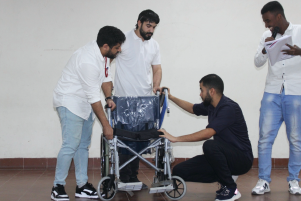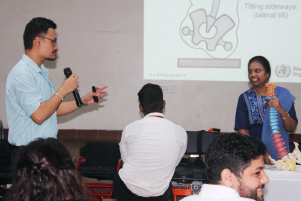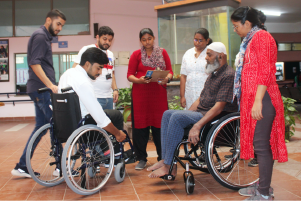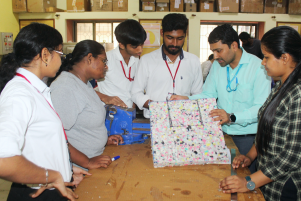
Following the release in 2008 of our Guidelines on the provision of Manual Wheelchairs in less resourced settings, WHO, in partnership with the United States Agency for International Development (USAID), has initiated the development of a wheelchair service training package for different levels of personnel.
The wheelchair is one of the most common assistive devices. The Convention on the Rights of Persons with Disabilities (CRPD) highlights the responsibility of states to ensure personal mobility and to promote the availability of and access to such devices. It is estimated that 70 million people require wheelchairs worldwide, yet only 5-15% of people have access. Wheelchair service provision is very underdeveloped across the world. People in developing countries often depend on donated wheelchairs, which are frequently of poor quality and not suitable either for the users or their environment. Health and rehabilitation professionals are not always trained adequately to ensure people with disabilities get a quality wheelchairs.
Basic Level
It is the first of the planned series of training packages that will support improvements in wheelchair service provision. This training package is to develop the skills and knowledge of personnel involved in wheelchair service delivery. Delivery of the training package will help to
- Increase the number of wheelchair users who receive a wheelchair which meets their needs;
- Increase the number of wheelchair users who receive training in the use and maintenance of wheelchairs and how to stay healthy in a wheelchair;
- Increase the number of personnel trained in basic-level wheelchair service delivery;
- Improve the competencies of wheelchair service providers and therefore the quality of wheelchair service delivery and
- Achieve greater integration of wheelchair service delivery into rehabilitation services.
Who should attend?
This training package is for all personnel or volunteers working who are expected to carry out intermediate-level wheelchair service delivery in their place of work. This may include health, rehabilitation, or technical personnel, community health care or rehabilitation (CBR) workers, occupational therapists, physiotherapists, prosthetists, orthotists, local craftsmen, technicians, and wheelchair users.
Intermediate Level
The main purpose of the WSTP Intermediate is to extend the skills and knowledge of personnel involved in wheelchair service delivery. Delivery of this training package will help to:
- Increase the number of wheelchair users who receive a wheelchair that meets their mobility and postural support needs;
- Increase the number of personnel trained in intermediate-level wheelchair service delivery;
- Improve the competencies of wheelchair service delivery personnel;
- Increase the quality of wheelchair service delivery; and
- Achieve greater integration of wheelchair service delivery within rehabilitation services.
Who should attend?
This training package is for all personnel or volunteers working who are expected to carry out intermediate-level wheelchair service delivery in their place of work. This may include health, rehabilitation, or technical personnel, community health care or rehabilitation (CBR) workers, occupational therapists, physiotherapists, prosthetists, orthotists, local craftsmen, technicians, and wheelchair users.
Manager Level
The manager’s module is a two-and-a-half-day workshop that provides an overview of the rehabilitation/wheelchair service manager’s role in engaging people and leading the implementation of the eight steps of wheelchair service delivery and issues related to it.
Who should attend?
Personnel who are responsible for implementing, managing, and evaluating rehabilitation services, including wheelchair services.



